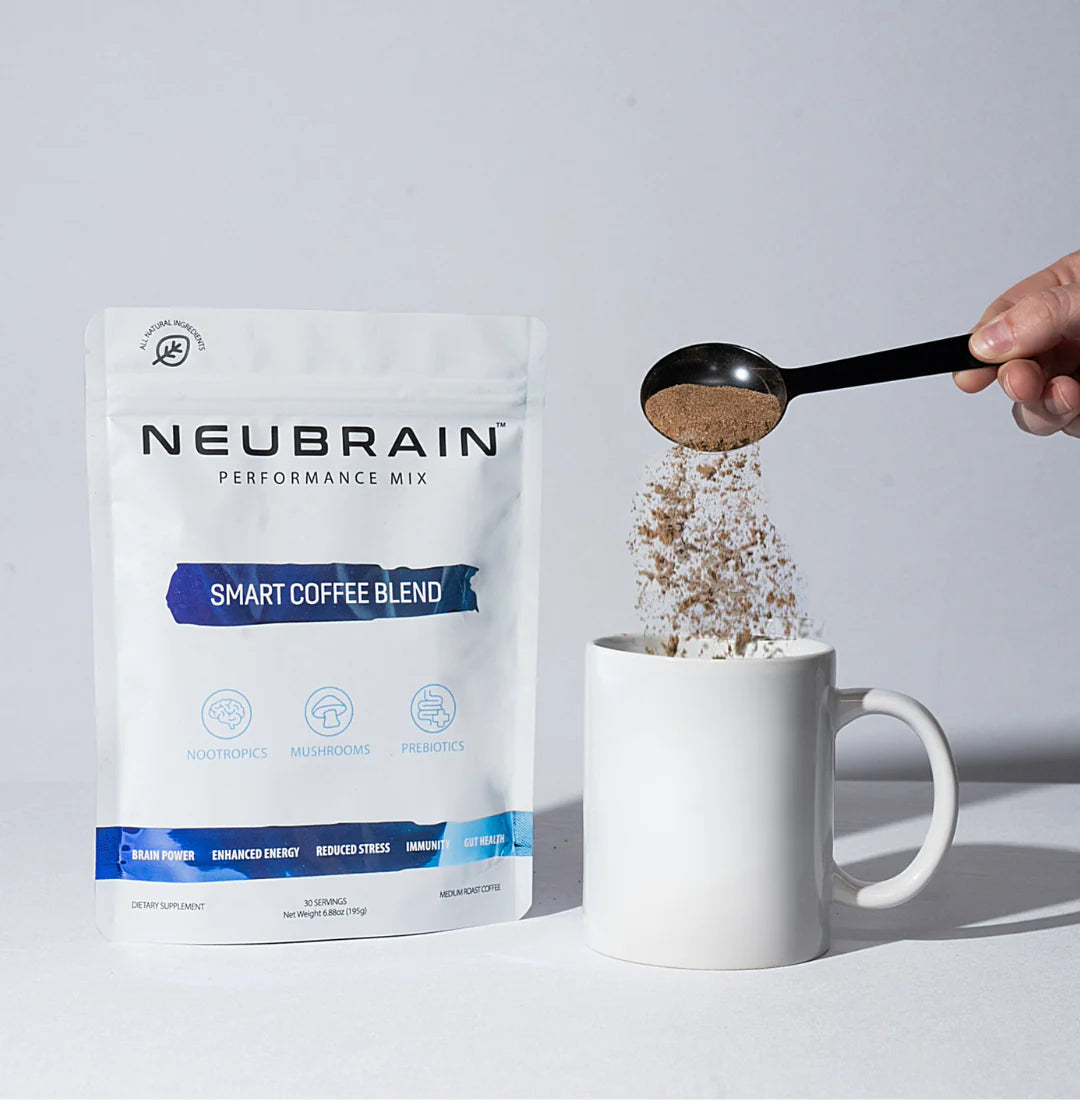How to Get Energy Without the Jitters: Proven Tips for Clean, Sustainable Focus
Millions of people rely on coffee, energy drinks, or caffeine pills to power through long days — only to end up feeling shaky, wired, and anxious. The “coffee jitters” are real, and they can ruin your focus, productivity, and even your sleep.
But good news: science shows there are ways to boost your energy naturally, without the rollercoaster ride of highs and crashes. Here’s how to get clean, sustainable energy — so you can stay sharp and calm, all day long.
Why Caffeine Alone Can Cause Jitters
Caffeine is the world’s most popular stimulant for a reason. According to the U.S. Food & Drug Administration (FDA), about 80% of U.S. adults consume caffeine daily (FDA.gov). But high doses — or poor timing — can cause:
-Anxiety or nervousness
-Rapid heartbeat
-Digestive discomfort
-Disrupted sleep
The FDA recommends limiting daily caffeine to 400 mg or less for most healthy adults to reduce these side effects (FDA.gov).
How to Get Energy Without the Jitters
When you feel that afternoon slump or struggle to stay alert during long workdays, it’s tempting to grab another cup of coffee — or worse, reach for energy drinks loaded with sugar and chemicals. But too much caffeine or low-quality stimulants can leave you feeling wired, anxious, and drained.
Instead of spiking your energy only to crash hours later, try building daily habits that naturally keep your energy levels high — without the stress on your nervous system. Research shows that combining smart nutrition, gentle movement, proper sleep, and proven nootropics can help you feel focused and energized all day — minus the jitters and crashes that come with traditional energy hacks.
Here are science-backed tips to boost your energy the smarter way:
Here are proven, research-backed ways to boost your energy and focus — minus the shaky side effects:
Pair Caffeine With L-Theanine
One of the most effective tricks for clean, steady energy is combining caffeine with L-theanine — a natural amino acid found in green tea.
Unlike caffeine alone, which can overstimulate your nervous system and increase anxiety, L-theanine works by boosting alpha brain waves. These brain waves are associated with a relaxed but alert mental state, helping to smooth out the “spiky” feeling that plain coffee can cause.
Multiple studies have shown that this combo supports sustained attention, improved focus, and reduced mental fatigue — without the nervous edge.
This is why you’ll often see high-performance coffee or matcha blends pairing natural caffeine with added L-theanine — so you can enjoy the clarity you want, without the shaky hands or energy crash.
✅ Practical tip: Instead of downing your usual cup of black coffee, switch to matcha, which naturally contains both caffeine and L-theanine. Or try a premium mushroom coffee blend that adds L-theanine for smooth, focused energy that lasts.
How it works: L-theanine helps reduce caffeine’s overstimulating effect by promoting calm, focused brainwaves (NIH.gov).
Try Adaptogens and Functional Mushrooms
Certain mushrooms, like Lion’s Mane, Reishi, Cordyceps, and Chaga, have been used for centuries to support energy, focus, and resilience to stress.
-Lion’s Mane: Supports brain health and focus
-Cordyceps: Naturally boosts endurance and energy
-Reishi: Calms the mind and supports restful sleep
The National Institutes of Health (NIH) highlights how adaptogens and functional mushrooms may help your body handle stress better (NIH.gov).
✅ Tip: Look for coffee alternatives that blend 100% fruiting body mushrooms with natural caffeine — for a cleaner energy boost.
Eat for All-Day Energy
Food is your body’s original energy source — but what you eat makes a big difference.
Research from the U.S. Department of Agriculture (USDA) shows that balanced meals with complex carbs, healthy fats, and protein keep your blood sugar stable — helping you avoid energy dips (Nutrition.gov).
✅ Smart choices:
-Whole grains (oats, quinoa)
-Nuts and seeds (almonds, chia)
-Lean proteins (eggs, fish)
-Fiber-rich fruits and veggies
Stay Hydrated
Hydration is one of the easiest — and most overlooked — ways to avoid that mid-afternoon fatigue and brain fog. According to MedlinePlus, losing even 1–2% of your body’s water content can lead to noticeable drops in energy, headaches, and poor concentration (MedlinePlus.gov).
When you’re dehydrated, your blood volume decreases, which makes your heart work harder to pump oxygen and nutrients throughout your body. This strains your body’s energy reserves and can make you feel tired and sluggish. If you’re drinking caffeine (which is mildly diuretic), it’s even more important to stay on top of your water intake.
✅ Hydration tip:
-Aim for at least 8–10 cups of water daily — more if you’re active, sweat a lot, or consume caffeine.
-Carry a reusable water bottle and sip throughout the day instead of chugging large amounts all at once.
-Add a pinch of sea salt or an electrolyte tab if you need an extra hydration boost.
Fatigue is one of the first signs of dehydration. According to MedlinePlus, even mild dehydration can affect your mood, focus, and energy levels (MedlinePlus.gov).
Move Your Body
You don’t need to spend hours in the gym to feel the energizing benefits of movement. Research from the Centers for Disease Control and Prevention (CDC) shows that light-to-moderate exercise increases circulation, delivering more oxygen and nutrients to your muscles and brain (CDC.gov). This means better mental clarity, focus, and endurance.
Physical activity also helps regulate hormones that impact energy, like cortisol and adrenaline. Even short bursts of movement can reduce fatigue and increase alertness. So the next time you feel groggy or can’t concentrate, resist the urge to grab another coffee — stand up, stretch, or take a quick walk instead.
✅ Energy boost ideas:
-Take a brisk 10–15 minute walk outside for fresh air.
-Do some gentle yoga or stretches between meetings.
-Try a 5-minute bodyweight circuit: squats, lunges, push-ups, and jumping jacks can quickly get your blood flowing.
Regular daily movement (even in small doses) adds up to more balanced energy levels throughout your day.
The Centers for Disease Control and Prevention (CDC) recommends at least 150 minutes of moderate activity per week for optimal energy and health (CDC.gov).
Get Enough Sleep — and Prioritize Quality
No energy-boosting hack beats real, restorative sleep. It’s your body’s primary way of recovering from daily stress and replenishing energy stores. According to the CDC, adults should aim for 7–9 hours of quality sleep each night (CDC.gov). Yet millions of people cut corners, relying on caffeine and sugar to mask sleep debt — which just fuels the cycle of burnout and jitters.
Poor sleep can increase your body’s production of stress hormones, weaken your immune system, and make your brain feel foggy and slow. Over time, you become more sensitive to caffeine’s negative side effects because your adrenal system is overworked.
✅ Sleep tip:
-Set a regular bedtime and wake-up time — even on weekends — to stabilize your internal clock.
-Wind down at least 30–60 minutes before bed. Dim the lights, avoid screens, and try reading or gentle stretching.
-Keep your bedroom cool, dark, and quiet for optimal sleep quality.
When you get consistent, restful sleep, your body naturally produces more energy — and you’ll find you rely less on caffeine or other stimulants to power through your day.
No amount of caffeine can replace real sleep. Adults need 7–9 hours of quality sleep per night to recharge fully (CDC.gov).
Key Takeaway
You don’t have to give up coffee altogether — you just need a smarter approach.
By combining caffeine with calming ingredients like L-theanine, using adaptogens, and making small lifestyle tweaks, you can enjoy clean, steady energy — without the jitters or crash.
Final Thought
If you’re ready to swap energy spikes and crashes for all-day mental clarity, consider trying a premium mushroom coffee with real adaptogens, L-theanine, and zero artificial additives. Your brain and body will thank you.








